英语词语辨析总结
英语常用词语辨析
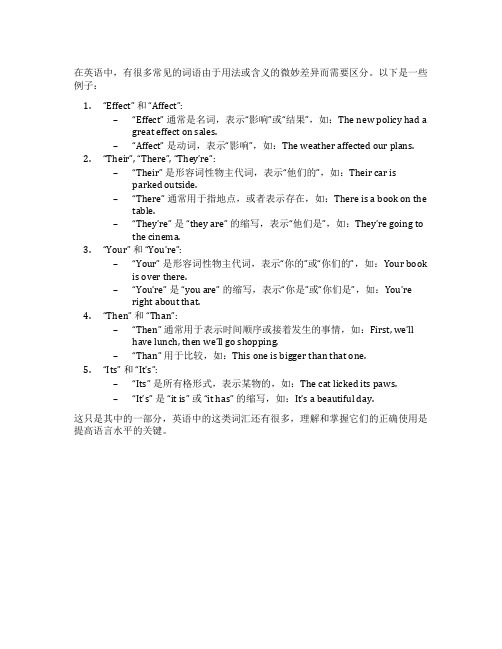
在英语中,有很多常见的词语由于用法或含义的微妙差异而需要区分。
以下是一些例子:1.“Effect” 和“Affect”:–“Effect” 通常是名词,表示“影响”或“结果”,如:The new policy had a great effect on sales.–“Affect” 是动词,表示“影响”,如:The weather affected our plans. 2.“Their”, “There”, “They’re”:–“Their” 是形容词性物主代词,表示“他们的”,如:Their car isparked outside.–“There” 通常用于指地点,或者表示存在,如:There is a book on the table.–“They’re” 是“they are” 的缩写,表示“他们是”,如:They’re going to the cinema.3.“Your” 和“You’re”:–“Your” 是形容词性物主代词,表示“你的”或“你们的”,如:Your book is over there.–“You’re” 是“you are” 的缩写,表示“你是”或“你们是”,如:You’re right about that.4.“Then” 和“Than”:–“Then” 通常用于表示时间顺序或接着发生的事情,如:First, we’ll have lunch, then we’ll go shopping.–“Than” 用于比较,如:This one is bigger than that one.5.“Its” 和“It’s”:–“Its” 是所有格形式,表示某物的,如:The cat licked its paws.–“It’s” 是“it is” 或“it has” 的缩写,如:It’s a beautiful day.这只是其中的一部分,英语中的这类词汇还有很多,理解和掌握它们的正确使用是提高语言水平的关键。
高考英语常用词语辨析
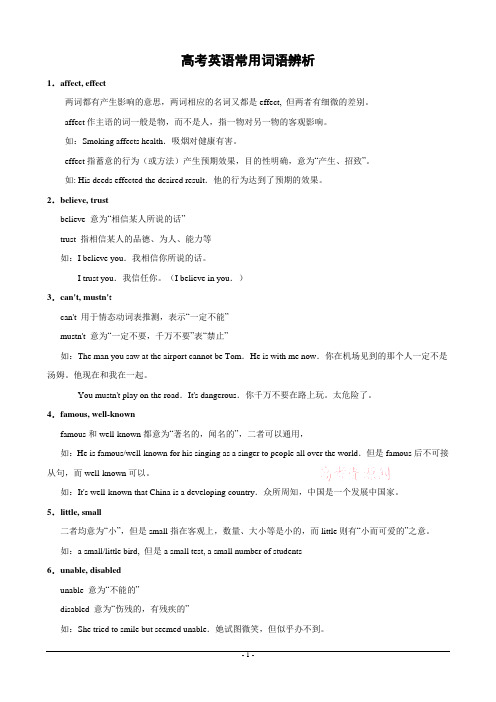
高考英语常用词语辨析1.affect, effect两词都有产生影响的意思,两词相应的名词又都是effect, 但两者有细微的差别。
affect作主语的词一般是物,而不是人,指一物对另一物的客观影响。
如:Smoking affects health.吸烟对健康有害。
effect指蓄意的行为(或方法)产生预期效果,目的性明确,意为“产生、招致”。
如: His deeds effected the desired result.他的行为达到了预期的效果。
2.believe, trustbelieve 意为“相信某人所说的话”trust 指相信某人的品德、为人、能力等如:I believe you.我相信你所说的话。
I trust you.我信任你。
(I believe in you.)3.can't, mustn'tcan't 用于情态动词表推测,表示“一定不能”mustn't 意为“一定不要,千万不要”表“禁止”如:The man you saw at the airport cannot be Tom.He is with me now.你在机场见到的那个人一定不是汤姆。
他现在和我在一起。
You mustn't play on the road.It's dangerous.你千万不要在路上玩。
太危险了。
4.famous, well-knownfamous和well-known都意为“著名的,闻名的”,二者可以通用,如:He is famous/well-known for his singing as a singer to people all over the world.但是famous后不可接从句,而well-known可以。
如:It's well-known that China is a developing country.众所周知,中国是一个发展中国家。
常用英语词语用法辨析
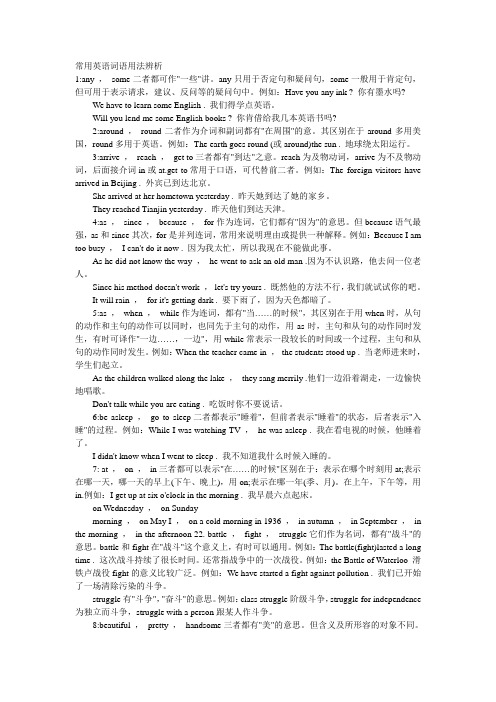
常用英语词语用法辨析1:any ,some二者都可作"一些"讲。
any只用于否定句和疑问句,some一般用于肯定句,但可用于表示请求,建议、反问等的疑问句中。
例如:Have you any ink ? 你有墨水吗?We have to learn some English . 我们得学点英语。
Will you lend me some English books ? 你肯借给我几本英语书吗?2:around ,round二者作为介词和副词都有"在周围"的意。
其区别在于around多用美国,round多用于英语。
例如:The earth goes round (或around)the sun . 地球绕太阳运行。
3:arrive ,reach ,get to三者都有"到达"之意。
reach为及物动词,arrive为不及物动词,后面接介词in或at.get to常用于口语,可代替前二者。
例如:The foreign visitors have arrived in Beijing . 外宾已到达北京。
She arrived at her hometown yesterday . 昨天她到达了她的家乡。
They reached Tianjin yesterday . 昨天他们到达天津。
4:as ,since ,because ,for作为连词,它们都有"因为"的意思。
但because语气最强,as和since其次,for是并列连词,常用来说明理由或提供一种解释。
例如:Because I am too busy ,I can't do it now . 因为我太忙,所以我现在不能做此事。
As he did not know the way ,he went to ask an old man .因为不认识路,他去问一位老人。
高级英语词语辨析
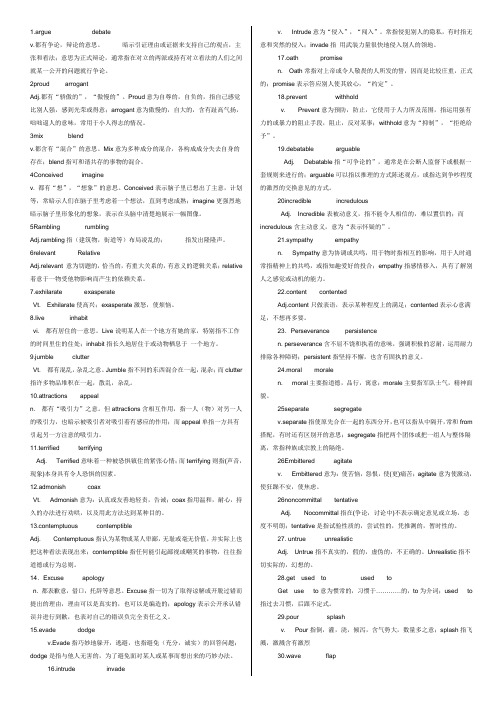
1.argue debatev.都有争论,辩论的意思。
暗示引证理由或证据来支持自己的观点,主张和看法;意思为正式辩论,通常指在对立的两派或持有对立看法的人们之间就某一公开的问题就行争论。
2proud arrogantAdj.都有“骄傲的”,“傲慢的”。
Proud意为自尊的,自负的,指自己感觉比别人强,感到光荣或得意;arrogant意为傲慢的,自大的,含有趾高气扬,咄咄逼人的意味,常用于小人得志的情况。
3mix blendv.都含有“混合”的意思。
Mix意为多种成分的混合,各构成成分失去自身的存在;blend指可和谐共存的事物的混合。
4Conceived imaginev. 都有“想”,“想象”的意思。
Conceived表示脑子里已想出了主意,计划等,常暗示人们在脑子里考虑着一个想法,直到考虑成熟;imagine更强烈地暗示脑子里形象化的想象,表示在头脑中清楚地展示一幅图像。
5Rambling rumblingAdj.rambling指(建筑物,街道等)布局凌乱的;指发出隆隆声。
6relevant RelativeAdj.relevant 意为切题的,恰当的,有重大关系的,有意义的逻辑关系;relative 着意于一物受他物影响而产生的依赖关系。
7.exhilarate exasperateVt. Exhilarate使高兴;exasperate激怒,使烦恼。
8.live inhabitvi. 都有居住的一意思。
Live说明某人在一个地方有她的家,特别指不工作的时间里住的住处;inhabit指长久地居住于或动物栖息于一个地方。
9.jumble clutterVt. 都有混乱,杂乱之意。
Jumble指不同的东西混合在一起,混杂;而clutter 指许多物品堆积在一起,散乱,杂乱。
10.attractions appealn. 都有“吸引力”之意。
但attractions含相互作用,指一人(物)对另一人的吸引力,也暗示被吸引者对吸引着有感应的作用;而appeal单指一方具有引起另一方注意的吸引力。
英语易混词语辨析

英语易混词语辨析
1.some一般用于肯定的陈述句中,any多用于否认句、疑问句或条件句中。
两者都可修饰可数名词,也可修饰不可数名词。
例如:There is some water in the cup.
Do you have any friends in Shanghai?
If you have any help, let me know.
2.在疑问句中有时也用some,表示希望得到肯定的答复或表示请求、建议、命令等含义。
例如:Would you like some more tea?
3.any也可以用在肯定陈述句中或条件状语从句中,表示任何的、任何一个的,其后接名词单数形式。
例如:Jim runs faster than any other student in his class.
1.few, a few修饰可数名词复数形式,little, a little 修饰不可数名词。
2.a few,a little有肯定含义,译作有几个,有一点;而few 和little表否认,译作没有几个,没有多少。
many, much和a lot of/lots of
都是许多的意思,many后接可数名词复数形式,much后接不可数名词,a lot of/lots of后接可数名词复数形式或不可数名词都可以。
each对两个或两个以上的人或物而言,侧重于个体,且可单独作主语、宾语等;every是对三个或三个以上的人或事物而言,侧重整体情况,且不能单独使用,只能做修饰词。
常见英语词语辨析整理

让知识带有温度。
常见英语词语辨析整理
常见英语词语辨析
attribute, ascribe
这两个动词均有“把……归于”之意。
1.attribute :指出于信任而把……归于某人或某物,含较多的客观性。
例如:He attributes his success to working hard.(他认为他的胜利是艰苦工作的结果。
)
2.ascribe :指依据推论或猜想把……归于某人或某物,含主观臆断成分较重。
例如:Darren ascribed his success to luck.(达伦把他的胜利归因于运气。
)
author, writer
这两个名词均有“,作家”之意。
1.author :泛指用自己名字或笔名发表过作品的人,不强调是否以写作为主职业。
例如:Do you read many French authors?(你阅读过很多法国作家写的书吗?)
第1页/共2页
千里之行,始于足下。
2.writer :含义广泛,一般指以写作为职业的人。
例如:Dickens was a famous English writer.(狄更斯是英国闻名作家。
)
【常见英语词语辨析】
文档内容到此结束,欢迎大家下载、修改、丰富并分享给更多有需要的人。
第2页/共2页。
英语单词辨析小结
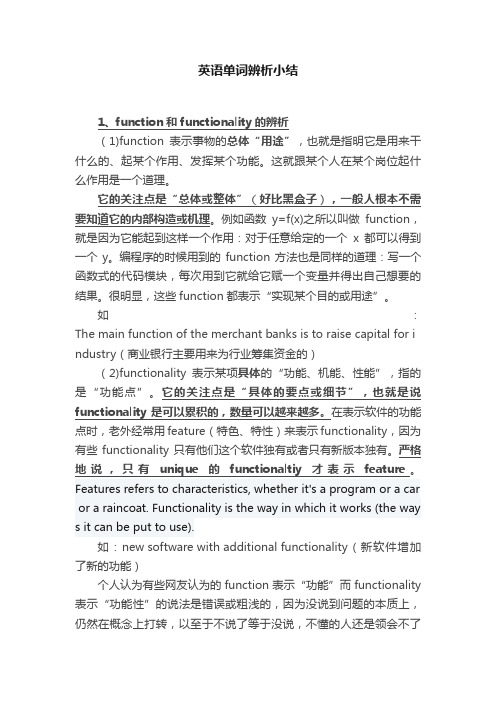
英语单词辨析小结1、function和functionality的辨析(1)function表示事物的总体“用途”,也就是指明它是用来干什么的、起某个作用、发挥某个功能。
这就跟某个人在某个岗位起什么作用是一个道理。
它的关注点是“总体或整体”(好比黑盒子),一般人根本不需要知道它的内部构造或机理。
例如函数y=f(x)之所以叫做function,就是因为它能起到这样一个作用:对于任意给定的一个x都可以得到一个y。
编程序的时候用到的function方法也是同样的道理:写一个函数式的代码模块,每次用到它就给它赋一个变量并得出自己想要的结果。
很明显,这些function都表示“实现某个目的或用途”。
如:The main function of the merchant banks is to raise capital for i ndustry(商业银行主要用来为行业筹集资金的)(2)functionality表示某项具体的“功能、机能、性能”,指的是“功能点”。
它的关注点是“具体的要点或细节”,也就是说functionality是可以累积的,数量可以越来越多。
在表示软件的功能点时,老外经常用feature(特色、特性)来表示functionality,因为有些functionality只有他们这个软件独有或者只有新版本独有。
严格地说,只有unique的functionaltiy才表示feature。
Features refers to characteristics, whether it's a program or a car or a raincoat. Functionality is the way in which it works (the way s it can be put to use).如:new software with additional functionality(新软件增加了新的功能)个人认为有些网友认为的function表示“功能”而functionality 表示“功能性”的说法是错误或粗浅的,因为没说到问题的本质上,仍然在概念上打转,以至于不说了等于没说,不懂的人还是领会不了其中的区别。
英文单词辨析
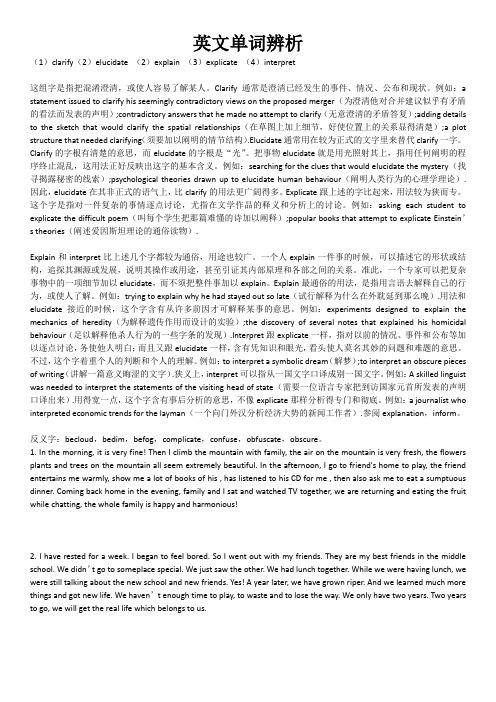
英文单词辨析(1)clarify(2)elucidate (2)explain (3)explicate (4)interpret这组字是指把混淆澄清,或使人容易了解某人。
Clarify通常是澄清已经发生的事件、情况、公布和现状。
例如:a statement issued to clarify his seemingly contradictory views on the proposed merger(为澄清他对合并建议似乎有矛盾的看法而发表的声明);contradictory answers that he made no attempt to clarify(无意澄清的矛盾答复);adding details to the sketch that would clarify the spatial relationships(在草图上加上细节,好使位置上的关系显得清楚);a plot structure that needed clarifying(须要加以阐明的情节结构).Elucidate通常用在较为正式的文字里来替代clarify一字。
Clarify的字根有清楚的意思,而elucidate的字根是“光”。
把事物elucidate就是用光照射其上,指用任何阐明的程序终止混乱,这用法正好反映出这字的基本含义。
例如:searching for the clues that would elucidate the mystery(找寻揭露秘密的线索);psychological theories drawn up to elucidate human behaviour(阐明人类行为的心理学理论).因此,elucidate在其非正式的语气上,比clarify的用法更广阔得多。
Explicate跟上述的字比起来,用法较为狭而专。
这个字是指对一件复杂的事情逐点讨论,尤指在文学作品的释义和分析上的讨论。
英语词语辨析

英语词语辨析pparatus, instrument, device, equipment, tool, implement, appliance, facilities这些名词均有“仪器、设备、器械、器具”之意。
1.apparatus :既可指某种具体的由许多不同零件构成的复杂的仪器、装置或器械,又可指它们的总称。
The astronauts have special breathing apparatus. (宇航员有特殊的呼吸装置。
)2.instrument :通常指能使人们完成某一精确动作或测量的一种小型仪器,尤指电工仪表、测量装置,航海或航空用的控制装置。
Thanks for the accurate instrument, which helps the sailors to avoid the submerged reef.(多亏了这个精密仪器才使得水手们避开了暗礁。
)3.device :多指为某一特殊用途或解决某一特定机械问题而设计或改装的精巧的仪器或装置。
A computer is a device for processing information. (电脑是用来处理信息的。
)4.equipment :多指成套的或重型的设备或装备。
通常用作不可数名词。
We must fit the expedition out with the best equipment. (我们必须向探险队提供最好的装备。
)5. tool :一般指进行特种工作的手工工具,也可指人造使用动力的工具,还可作引申用。
I have a complete set of carpenter's tools. (我有全套的木工工具。
)The king was just the tool of the military government. (国王只是军政府的一个傀儡。
)(引申)6.implement :原指史前人类所用的工具,现在多指农用工具,也可指为实现某个任务所需的工具或器具。
高中英语重点辨析词语

中学英语重点辨析词语1. damage, harm, hurt, injure,ruindamage:主要指造成价值、效用、完整性方面的损坏,多用于无生命的东西。
The water they had thrown over everything to put out the fire damaged the books.harm:主要用于有生命的东西,间或也用于无生命的事物,常指伤及一个人的健康、权利、事业等。
Though he knows clearly that smoking harms his health, he simply cannot give it up.hurt:尤其指感情或身体遭遇创伤。
My little boy fell off a ladder and hurt himself.You hurt my feelings!injure:尤指在事故中受伤,或损害,损害名誉、自尊等。
Three people were killed and five injured in the crash..ruin: 破坏,使毁坏,这种破坏是使某物价值或用处失去。
My new shoes got ruined in the mud.2.can & be able to 都可以表示能够。
can 有实力做某事,只有现在式和过去式两种形式。
be able to表示要经过一番努力才能做到的事,可用于各种时态,不能用与can连用。
If I concentrate on the work, I'll be able to work out the problem.I'll be able to speak French in another few months.3.grateful to & grateful for 都表示感谢。
grateful to指对……表示感谢,其中的介词to表示对象,宾语通常是人或组织团体。
英语词语辨析

英语词语辨析
英语词语辨析
big/ large/ great/ huge
Ⅰ. big 和large 所修饰的一般是具体的事物。
big 侧重于表示一个物体的块头、重量,含有庞大、笨重的意思,其反义词是little;
large 侧重表示一个物体的宽度和数量,有广阔和众多的含义,其反义词是small。
在现代口语中两者常可互换,big 较口语化,large 比较正式。
如:
① This is a big / large room. 这是一个大房间。
② This coat is too big for her. 这上衣对她来说太大了。
③ China is a large country. 中国是一个幅员辽阔的国家。
Ⅱ. big 还可作长大了的`解,而large没有这个意思。
如:
① She is big enough to ride a bike.
她长大了,足可以骑自行车了。
Ⅲ. great 常表示伟大的,可修饰抽象名词,也可修饰具体的人或物,带有一定的感情色彩。
有时可能表达说话人的喜悦、赞扬等感情。
如:
① We are going to visit the Peoples Great Hall. 我们打算去参观人民大会堂。
② Einstein was a great scientist. 爱因斯坦是位伟大的科学家。
③ --How do you like my coat? --Great!
你觉得我这件外衣怎样?好极了。
英语词汇辨析
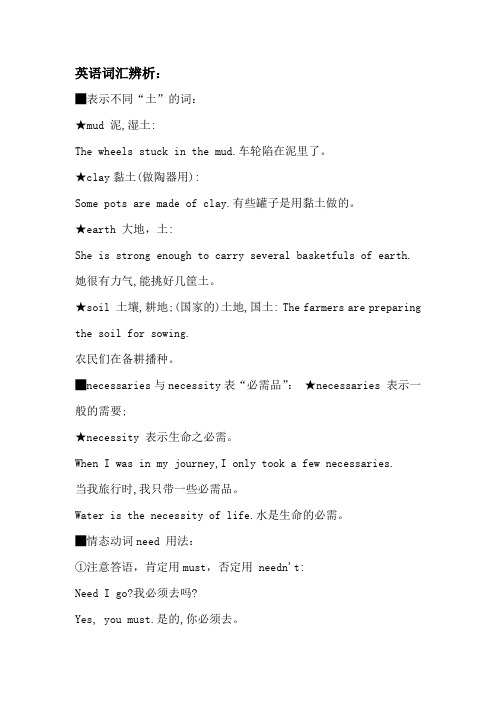
英语词汇辨析:█表示不同“土”的词:★mud 泥,湿土:The wheels stuck in the mud.车轮陷在泥里了。
★clay黏土(做陶器用):Some pots are made of clay.有些罐子是用黏土做的。
★earth 大地,土:She is strong enough to carry several basketfuls of earth. 她很有力气,能挑好几筐土。
★soil 土壤,耕地;(国家的)土地,国土: The farmers are preparing the soil for sowing.农民们在备耕播种。
█necessaries与necessity表“必需品”:★necessaries 表示一般的需要;★necessity 表示生命之必需。
When I was in my journey,I only took a few necessaries.当我旅行时,我只带一些必需品。
Water is the necessity of life.水是生命的必需。
█情态动词need 用法:①注意答语,肯定用must,否定用 needn't:Need I go?我必须去吗?Yes, you must.是的,你必须去。
No, you needn't.不,你不必去。
②need not have done表示某一个已经发生的动作实际上不必发生,常译为"不必…也行”等:He need not have come last night.他昨晚本来无需来的。
(但实际来了)▲比较:He didn't need to come last night.他昨晚不必来。
(实际上也没有来)③过去时用had to,将来时用will have to代替。
█near 和 nearly 的区别★near ①副词②形容词③介词④动词:意思为“近”,“接近”,作副词时还有“几乎”之意。
常用英语词语辨析105组

1.elder 与elderly两者都为“年⽼的”,但有细微的差别。
elderly 指中年与暮年之间的年龄,表⽰⼈已过中年,因此,这词常⽤来代替 old。
如:an elderly gentleman. ⼀位年长的绅⼠。
elder指年龄稍长者,适⽤于家庭的兄弟姐妹之间。
如: Tom is the elder of the two.汤姆是两个孩⼦中较⼤的⼀个。
2.precious 和 expensiveexpensive 表⽰“昂贵的”。
如:The drink was cheap , but the food was very expensive . 饮料很便宜,但⾷物很贵。
precious 表⽰“珍贵的,宝贵的”。
如:The children are precious to me . 孩⼦们对我来说很重要。
3.regret to do 和 regret doingregret doing 表⽰“做了某事⽽感到遗憾或后悔”,v-ing 动作发⽣在regret 之前。
如:I regretted missing the train. 我为没有赶上⽕车⽽感到很懊恼。
regret to do 指“当时或现在遗憾地做什么”。
如:I regret to tell you that we can 't stay here any longer. 我遗憾地告诉你,我们不能在这⼉多呆了。
4.day by day 和 day after day两词组意思很近,但有区别:day by day 只⽤作状语,表⽰“⼀天天地”, 有逐渐转变的意思。
如:Day by day she seems to grow a little taller.她似乎⼀天天地长⾼了。
day after day 可作主语,宾语等,亦可作状语,表⽰“⼀天⼜⼀天”,强调动作的重复,表⽰时间的长久。
如: We do the same work day after day. 每天我们做着同样的事情。
词语的词性辨析与用法
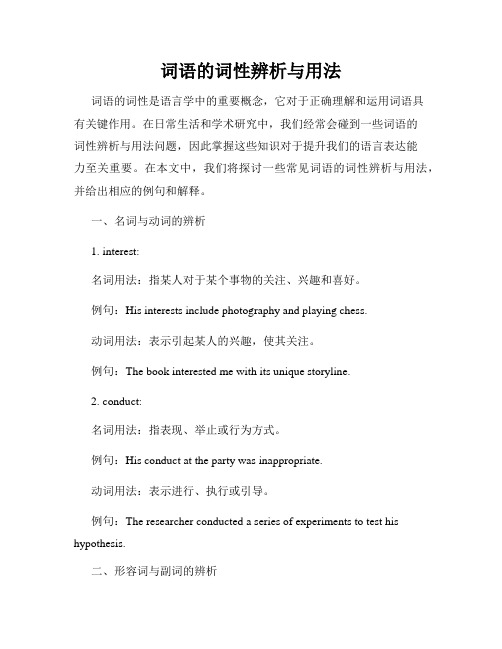
词语的词性辨析与用法词语的词性是语言学中的重要概念,它对于正确理解和运用词语具有关键作用。
在日常生活和学术研究中,我们经常会碰到一些词语的词性辨析与用法问题,因此掌握这些知识对于提升我们的语言表达能力至关重要。
在本文中,我们将探讨一些常见词语的词性辨析与用法,并给出相应的例句和解释。
一、名词与动词的辨析1. interest:名词用法:指某人对于某个事物的关注、兴趣和喜好。
例句:His interests include photography and playing chess.动词用法:表示引起某人的兴趣,使其关注。
例句:The book interested me with its unique storyline.2. conduct:名词用法:指表现、举止或行为方式。
例句:His conduct at the party was inappropriate.动词用法:表示进行、执行或引导。
例句:The researcher conducted a series of experiments to test his hypothesis.二、形容词与副词的辨析1. fast:形容词用法:指速度快的。
例句:He drives a fast car.副词用法:指速度快地。
例句:He ran fast to catch the bus.2. hard:形容词用法:指坚硬的或困难的。
例句:The rock was too hard to break.副词用法:指努力地或困难地。
例句:He worked hard to achieve his goals.三、动词与形容词的辨析1. bear:动词用法:指忍受、承受或容忍某事物。
例句:She couldn't bear the pain anymore.形容词用法:指与熊相关的。
例句:We saw a bear cub in the forest.2. right:动词用法:指纠正或调整某事物。
高中英语单词辨析

高中英语词组辨析〔整理〕1.2.3.ifif ready 如果准备好if so 如果这样的话if not 如果不是这样的话if necessary 如果有必要的话if possible 如果有可能的话if any 如果有…的话if only 要是…的就好if ever 极少,难得4.thanrather than 而不是other than 除了more than 多余…不仅仅是less than 少于worse than 比…更差5.in no time 立刻at one time 曾经at no time 绝不at a time 一次the first | ne*t time …相当于连词,后接句子for the first time 第一次,相当于副词It /This is the first /second…time that sb has/have done sth.was had done sth. It’s time that sb did sth.7.8.forbid somebody from doing sth.discourage sb. from doing sth.prevent sb. from doing sth.keep sb. from doing sth .stop sb. from doing sth.9.Setbe set in 以…为背景set out / off for sp. 动身去*地set sail for sp. 起航去*地set out to do sth. =set about doing sth .着手做*事set off 出发,引发,燃放set up 创立,建立set down =put /write/take down 写下,记录下set aside 省出,留出,把…放在一边set the table =lay the table 摆放餐具,准备吃饭10.Breakbreak out 战争爆发break in 插话,闯入break up (关系)破裂break off 打断,中断break through 突破break down 机器坏了,精神奔溃break away 脱离11.Taketake on 呈现,雇佣take after sb. 在〔长相或性格〕像*人take back 收回前言take down 记下,取下take in 理解,吸收,欺骗,将衣服改小take off 脱下,起飞,〔事业〕成功take over 承受,接收take up 继续,占据,开场从事*事take into 把…带入take away 带走take place 发生take apart 拆卸take part in 参加cut back on 削减,减缩cut across 抄近路通过cut away 切除cut in 插嘴cut off 切断cut down 砍到,削减 cut up 切碎 cut out 去除 cut after 追赶cut short 使…突然停顿,中断,打断try on 试穿,试验 try out 试用,试验try out for 参加…的选拔try sth. on 在*人/*物上试*物 try to do sth. 努力… try doing sth. 尝试…try one ’s best 尽最大努力 have a try 尝试 lose heart 灰心lose one ’s heart to 喜欢… lose face 丢脸lose weigh 减肥lose faith in 对…失去信心lose touch with sb. 失去与*人的联系lose one’s way 迷路lose one’s life 丧生lose one’s job 失业19.表“因为〞的短语as a result /consequence ofbecause ofthanks todue toon account ofowing to20.与leave 有关的短语leave for 离开去…leave sb. with sth. 给*人留下…leave out 删除,省略leave behind 遗忘,使…落后leave word 留言leave aside 搁置,不考虑leave alone 更不用说leave behind 把…抛在后面,离开leave off 遗漏,停顿〔leave off doing sth.〕leave over 剩下,推迟21.22.be associated withbe connected withbe related withbe linked tohaving something to do with23.与24.be engaged inbe absorbed inbe buried inbe addicted in25.e into force/effect/view/e*istence掌权,生效,近在眼前,出现26.与“bring〞相关的短语bring sb. to do 使*人做…bring sb. doing 引来*人做…bring about 带来,造成bring down 到达,降低bring forward 提出bring in 收〔庄稼〕,引来,引进,挣得,生产,出产bring out 使显出,使…明白的显现出来bring up 教育,抚养,呕吐27.for show 为着外衣,为装门面on show 在展出show sb. around 领*人参观…show sb. in/out 领*人进来/进去show off 炫耀,卖弄show oneself 出现,现身show up 出席,露面,使…突出,显眼30.与“give〞有关的短语give one’s life to 把生命奉献给…give away 赠送,泄露give in 〔to sb 〕屈服,让步〔于…〕give off 发出〔光,烟,气味等〕give out 发出…分发,用尽,筋疲力尽give over to 支付…把…托付给give up 放弃give way 〔to〕让步,给…让路give back31.32.33.shut in 围绕shut away 把…隔绝shut down 牢牢的把…关上,关闭〔厂,店等〕,〔雾,黑暗〕笼罩shut off 关掉〔水,煤气,电等〕,遮挡,切断〔交通,道路〕shut out 不让…进入,遮挡住shut up 闭嘴,紧紧关上35.与“sight〞有关的短语at first sight 乍一看,第一眼就…at 〔the〕sight of 一看见…catch sight 看见…发现…in sight 在视野围之,看得见…out of sight 看不见的lose sight of 看不见,忽略above all首先,首要after all 毕竟all along 一直,始终all in all 总体来说all over 浑身,到处at all 根本〔用于否认句和条件句〕in all 总计,共计38.含有“have〞的短语have nothing /sth.in mon with 与…有共同之处have the talent to do sth.〔abilty 〕=have a talent /gift for 有做…的天赋have trouble /difficulty 〔in〕doing sth.做*事有困难have sb. do/doing have sth. donehave no choice but to do 做…别无选择,只能…have affection for 喜欢have an effect on 对…有影响have a vivid memory of 对…有清晰的印象39.let 的相关短语let alone 不打搅,不惊动,更别提let down 放下,使失望,不支持let in 让…进入let out 放出,发出,泄露let go 〔of〕松手,放弃let off 排放40.call有关的短语call for help 大声呼救make/pay a call on 拜访…make/give a call to 给..打call for 需要邀约call after 以*人的名字为…命名call in 召来,请来call on/upon 〔专程〕拜访*人,号召,指派call out 大声叫,召集call up 打,使….想起call at sp.(专程)拜访*地41.keep 相关的短语keep doing 继续做keep sb.doing 使*人做keep sth. done 使…被…keep from doing 防止做…keep sb. from doing阻止keep away 避开,使远离keep back 后退,使后退,抑制keep out 不进去,使留在外面keep up 〔with〕跟上,不落后look on/upon as…regard …as/to be …recognize …as…treat …as…think …as…. Cider sb./sth. to be /as…think …to be see …as …view…as..44.就*人而言from the point of view of sb. fom one’s point of viewin one’s opinionas far as sb. be concerned on a personal note personallyas to mein my view45.“决不〞的几种形式by no meansin no case/in no way under no circumstanceson no caseat no timeon no consideration46.离开前往*地make one’s way tobe off tohead forleave fordepart forset off for47.处理,解决see todeal with/do withhandlesolvesettlecope withfi*48.有能力做…have ability to do sth.be able to do sth.be capable of doing sth.be petent to do sth.give though to 思考be lost in thought 陷入沉思without thought 不假思索have thought of 有…的想法on second thought 转念一想read one’s thoughts 看懂*人的心思51.对…满意be happy/pleased/satisfied/content withbe content to do sth.做…感到快乐52.与“reach〞相关The beggar reached out his hands for money 伸出〔手〕beyond〔above ,out of 〕one ‘s hands 达不到的,力所不能及的,不能理解的make a reach for 〔sb./sth.〕生出手,企图抓住…within easy reach of 在容易到达…的地方,在…的附近within one’s reach在*人力所能及的围,在*人能到达的围reach for 生出手去抓住reach a conclusion 得出一个结论reach their destination 到达他们的目的地reach sb. by telephone 通过找到/联系*人reach to the back of the classroom 传到教室的后面。
英语词汇辨析
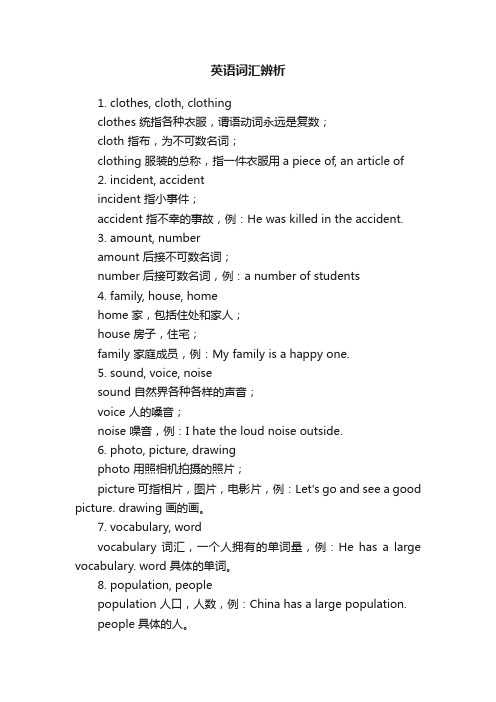
英语词汇辨析1. clothes, cloth, clothingclothes 统指各种衣服,谓语动词永远是复数;cloth 指布,为不可数名词;clothing 服装的总称,指一件衣服用a piece of, an article of2. incident, accidentincident 指小事件;accident 指不幸的事故,例:He was killed in the accident.3. amount, numberamount 后接不可数名词;number 后接可数名词,例:a number of students4. family, house, homehome 家,包括住处和家人;house 房子,住宅;family 家庭成员,例:My family is a happy one.5. sound, voice, noisesound 自然界各种各样的声音;voice 人的嗓音;noise 噪音,例:I hate the loud noise outside.6. photo, picture, drawingphoto 用照相机拍摄的照片;picture 可指相片,图片,电影片,例:Let's go and see a good picture. drawing 画的画。
7. vocabulary, wordvocabulary 词汇,一个人拥有的单词量,例:He has a large vocabulary. word 具体的单词。
8. population, peoplepopulation 人口,人数,例:China has a large population.people 具体的人。
9. weather, climateweather 一天内具体的天气状况;climate 长期的气候状况,例:The climate here is not good for you.10. road, street, path, wayroad 具体的公路,马路,例:take this roadstreet 街道,例:in the streetpath 小路,小径;way 道路,途径,例:Show me the way to the museum11. course, subjectcourse 课程(可包括多门科目),例:a summer coursesubject 科目(具体的学科)12. custom, habitcustom 传统风俗,习俗,也可指生活习惯,后接to do;habit 生活习惯,习惯成自然,后接of doing. 例:I've got the habit of drinking a lot.13. cause, reasoncause 指造成某一事实或现象的直接原因,后接of sth./doing sth;reason 用来解释某种现象或结果的理由,后接for sth./doing sth. 例:the reason for being late14. exercise, exercises, practiceexercise 运动,锻炼(不可数);exercises 练习(可数);practice(反复做的)练习,例:Practice makes perfect.15. class, lesson作“课”解时,两者可以替换。
- 1、下载文档前请自行甄别文档内容的完整性,平台不提供额外的编辑、内容补充、找答案等附加服务。
- 2、"仅部分预览"的文档,不可在线预览部分如存在完整性等问题,可反馈申请退款(可完整预览的文档不适用该条件!)。
- 3、如文档侵犯您的权益,请联系客服反馈,我们会尽快为您处理(人工客服工作时间:9:00-18:30)。
beat, win, conquer, defeat, overcome 这组词均有“获胜,征服,击败”之意beat指在战争、竞赛或其他方面最终彻底战胜对方,对象可以是人,也可以是物。
win指在竞赛或战斗中击败对方,其对象一般应是物,如battle, race, victory等。
conquer既可指靠武力或精神道方面的力量使对方屈服,又可指在排除障碍和阻力后取得胜利。
defeat意为“击败”,强调的是暂时的胜利。
overcome既可指在战斗和竞赛中战胜对方,也可指在感情、习惯等方面压倒,胜过如:We can easily beat you at baseball.打垒球我们可以轻易地击败你们。
The Chinese team won in the end.最后中国队赢了。
The Normans conquered England in 1066.1066年,诺曼底人征服了英格兰。
He defeated his opponents in this election.在这次竞选中,他击败了对手。
He made efforts to overcome every difficulty.他努力克服每一个困难。
award, reward 这组词均含有“授予,给予”的意思。
award意为“授予,给予”,通常指官方或法院根据规定把钱财等奖给或判给某人。
reward意为“酬劳,奖赏”,通常指因做了某一件事或提供了某种服务而应得到的报答或酬谢。
如: He was awarded a medal for his outstanding contribution to science.由于对科学作出了杰出贡献,他被授予一枚奖章。
He rewarded me with 30 dollars for taking him to the airport.我把他送到机场,他给了我30美元作酬金。
character, personality, nature, temperament, individuality 这组词都表示人的“脾气,性格”。
character意为“天性,性情,性格,个性;品格”,侧重人格、品质,特指道义方面的邪、正、强、弱等,也可笼统表示性格全貌。
另外character还有“特点,人物”等多种意义personalit意为“人格,个性,为人”,是在私下和社交场合体现的能影响他人对自己的印象或看法的性情、举止等。
personality也有“人物、名人”之意。
nature意为“本性,天性,性质”,指天生的,无法改变的品质或性格。
temperament意为“性情,脾气,气质”,主要指影响人的思想、感情及行为的性情、气质或人易激动、易怒等特点。
individuality为“个性、特征”,指与他人不同的、有显著特色的性格特征。
如: She is a woman of strong character. 她是个性格坚强的女人。
Love had to be a give and take, each respecting the other’s personality.爱既包含奉献也包含索取,彼此应尊重对方的人格。
It’s not her nature to be rude; she’s polite by nature.她的天性不是粗鲁无礼,而是彬彬有礼。
Many actors have excitable temperament.许多演员性情容易激动。
Dress expresses the wearer’s individuality.衣着反映人的个性。
intelligent, clever, bright, wise, smart 这组词均含“聪明”之意。
intelligent强调有学识、理解力或推理能力并能运用智力。
clever为普通用词,表示敏于学习和理解,思想、手段灵敏,但是缺乏深度和广度。
bright常用来形容年轻人或小孩,多用于口语。
wise是正式用语,用于人,表示智力发达,明辨是非,有健全的判断力,知识渊博,经验丰富。
smart常用于通俗口语,表示“机灵,精明,潇洒”之意。
When the water pipe burst, she was intelligent enough to turn off the water at the main.水管爆裂时,她的聪明才智使得她能够立刻切断主管道水源。
It’s really clever of you to find your way back here.你能找到回来的路,真聪明。
The girl is bright beyond her years.这个女孩年龄不大却很聪明。
It’s easy to be wise after the event.事后聪明容易。
The students look smart in their new school uniforms.这些学生穿着新校服很帅气。
capable, able, competent 这组词均含有“有能力”的意思。
capable强调有适合做某事的才能,如适应能力、应变能力,尤指处理实际工作的能力,常用于be capable of这一词组中。
able指具有明显地超出平均水平的能力,常用于be able to do结构中。
competent意为“胜任的,称职的”,指具有满足专门行业要求的能力。
如:He is capable of leadership.他有领导才能。
Tom is the ablest man I’ve ever met in England.汤姆是我在英国遇见的最有能力的人。
She was very competent at her work.她很胜任自己的工作。
edge, border, rim, verge 这组词皆有“边,边缘”之意。
edge通常指某物一边的边线、两个平面的交界线以及各种界线,其引申含义表示两个处于不同性质或状态之间的明显界线,特指处在不利状态下的边缘。
border意为“边界,边境,国境”,也可以指装饰周边的“边”。
rim意思是“边,边缘”,尤指圆形或近似圆形的物体的边缘。
verge特指道路、花坛等长着草的“边缘”。
verge常用于on the verge of 这一固定搭配中。
如:This is the north edge of the field.这是这块地的北边线。
The plane flew across the border.飞机飞越了边境。
He wears a pair of spectacles with gold rims.他戴一副金丝边眼镜。
She was on the verge of speaking out the secret.她差点儿把秘密说出来。
brief, concise, condensed, short 这组词均含有“简明,简洁”的意思。
brief和short同义,往往就时间、事件、写作、说话而言,表示暂时的、简短的、简洁的。
”concise指某人的言语或文体只用少量文字传达了大量信息。
condensed有“凝炼”之意,即被压缩的。
short是最普通的词,既可指时间,也可指空间。
如: I left him a brief note.我给他留了一个便条。
Most of Bacon’s essays are concise.培根的多数小品文都很简洁。
This news story is condensed.这篇新闻报道被压缩了。
His answer was short and to the point.他的回答简明扼要。
endure, bear, stand, tolerate, put up with 这组词都有“忍受,忍耐”之意。
endure比较正式,尤指忍受大的、持久的困难、痛苦、灾祸,常用于否定意义的句子中。
bear强调忍受者的坚韧。
stand意为“忍受,顶住”,多用于口语中,常用于否定句中,若用于肯定句,则意为“不屈不挠,经受得起”。
tolerate意为“容忍”,语气较前几个词弱。
put up with与tolerate意义相近,有“不计较,将就”之意,多用于口语。
如:He quietly endures the pain of a loveless marriage.他默默地忍受着没有爱情的婚姻的煎熬。
The sorrrow was almost more than she could bear.她几乎忍受不了那种悲伤。
I can’t stand hot weather.我受不了热天。
A government that refuses to tolerate opposition cannot last long.一个不听取反对意见的政府是不会长久的。
It’s hard for people to put up with that kind of treatment.人们很难忍受那种待遇。
basis, base, foundation 这组词均含有“基础”的意思。
在表示意见或判断的基础时,多用basis。
在表示具体事物的基础或底部时,可用base或foundation,但不能用basis。
base既可用于大物体也可用于小物体,而foundation只用于大物体,且多描述在地下的比较宏伟坚固的地基。
如:We reached this conclusion on the basis of many experiments.在多次实验的基础上,我们作出了这个结论。
I found a small leaf at the base of the flower.我在那朵花的底部发现一片小叶。
The workmen are laying the foundation of the new lecture building.工人们正在为新教学楼打地基。
shake, tremble, quake, shiver, quaver 这组词均含有“打破”或“挤碎”的意思。
shake适用范围广,可用于人也可用于物。
该词所表示的动作的方向既可以是水平的也可以是垂直的。
tremble专门用于表示人体轻微、迅速地振动,特别是当人激动、怯懦、寒冷、疲惫时不自觉地发抖。
quake可用来代替tremble,常表示剧裂震动,如地震等,也可表示人因天气寒冷发抖或因愤怒等强烈情绪而内心震动。
shiver意为“颤抖,哆嗦”,特指因寒冷或恐惧而打寒战,多用于人。
quaver有时表示不规则的震动或波动,尤其表示某些具有扰乱结果的震动或波动,它常常强调颤抖,特别是激动的情感对声音与言辞的影响。
To be shaken before taking.(药瓶标签用语)服前摇匀。
